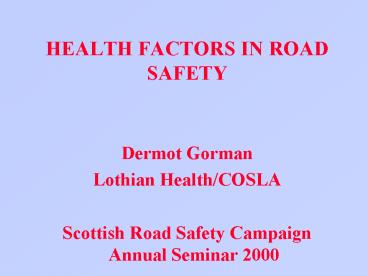HEALTH FACTORS IN ROAD SAFETY - PowerPoint PPT Presentation
1 / 24
Title:
HEALTH FACTORS IN ROAD SAFETY
Description:
... towards children taking dramatically less exercise, being fatter and less fit ... Co-operation with other parents. Car sharing. Sick Kids Cycle Study ... – PowerPoint PPT presentation
Number of Views:44
Avg rating:3.0/5.0
Title: HEALTH FACTORS IN ROAD SAFETY
1
HEALTH FACTORS IN ROAD SAFETY
- Dermot Gorman
- Lothian Health/COSLA
- Scottish Road Safety Campaign Annual Seminar 2000
2
OUTLINE
- Transport Inequalities HIA
- Transport, health and children
- Accident NHS statistics
- Partnerships for healthy transport policy
3
HIA of Edinburghs Transport Policy
- HIA the estimation of the effects of a specified
action on the health of a defined population - Alex Scott-Samuel 1998
- 1. Identify impacts using a framework
- 2. Evaluate identified impacts
- 3. Make recommendations
- 4. Present findings to decision makers
- 5. Monitor the actual health effects arising
- Margaret Douglas 1998
4
Edinburgh transport policy
- Scenario 1 cheap
- some 20mph limits
- improved paper information
- integrated ticketing
- Scenario 2 - 6.5 m
- 30-50 city at 20mph
- some traffic calming
- develop cycle network
- city centre pedestrianisation
- more Greenways
- 1 CERT busway
- park ride
5
Who was considered?
- People with different risk profiles
- Affluent car owners
- Deprived non-car owners
- Workers/Commuters
- Young families
- Adolescents
- Elderly
- Unemployed
- Business interests
6
Edinburgh transport policy main health impacts
- Accidents
- Pollution
- Physical activity
- Access to services
- Community networks
- Business and employment
7
Transport and Health vulnerable groups always
worst affected
- Traffic accidents
- reduction tends to concentrate on engineering
- Pollution - noise - particulates benzene
- Reduced physical activity
- Communities - access and opportunities
- food, shops, jobs, recreation, social support
8
Edinburgh HIA Conclusions
- The effect of transport on social exclusion is
crucial should be more widely recognised - All social groups gain most from spending more on
public transport reducing car dominance - Spending more on public transport narrows the gap
between affluent and deprived - Adolescents of all levels of affluence get
benefits from spending more - Health and business priorities are similar -
restricting out of town development is important
9
Road traffic accidents15 deaths, 200 serious,
2000 minor injuries120,000 deaths in WHO Euro
- Severity worse for pedestrians
- Vulnerable road users 35 of deaths
- Strategy for reduction based upon engineering,
enforcement and education - Inequalities a large feature
- international (10 fold difference in Europe)
local (x5 by Depcat) - 1/3 are under 25
- 13 million people in UK have no car access
10
(No Transcript)
11
Scotland, children inequalities
- Scotland has a worse child pedestrian accident
rate then England or EC - Risk of death in pedestrian accident highly class
related - 4 fold variation - also uptake of Children's Traffic Club
- Children make up 17 of all casualties and 46 of
pedestrian casualties
12
RTAs to children
- Particularly hard to plan prevention
- Closely linked to deprivation
- Education and experience
- Data collection difficulties
- STATS 19
- Litigation
- AE Department
- Hospital Admission
13
Physical Activity Health
- Heart disease
- Less diabetes osteoporosis - fewer falls and
injuries - Mental Health Wellbeing
- Respiratory Disease
14
Physical Activity in Children
- A recent trend towards children taking
dramatically less exercise, being fatter and less
fit - Fewer kids go out unaccompanied by an adult
- Behaviour patterns develop early - parents are
bad role models
15
Traffic calming in deprived areas
- Three types picked for different reasons
- Accident reduction (16 schemes 1.5m)
- Environmental traffic management (11, 1.6)
- Associated with Greenways schemes (10, 1.8)
16
(No Transcript)
17
Traffic calming brings
- Improved safety for pedestrians
- Children allowed out to play
- More walking and cycling
- Public consultation is critical
18
Safer Routes to School
- Encourages physical exercise
- Improves environment around schools
- Allows children to travel independently -
important for social and personal development - Children learn about transport and travel
- Helps parents and councils to save money
19
Parents 47 have safety issues about their
childs route
- Parents want
- Safe crossing facilities on main roads
- Better public transport
- Slower speeds on main roads
- Safer cycle routes
- Co-operation with other parents
- Car sharing
20
Sick Kids Cycle Study To monitor effects of more
cycle use
- 1. From Accident and Emergency records, identify
who attended the RHSC - 2. See how many were on STATS 19
- 3. Hospital admissions
21
Sick Kids Cycle Study - Results
- 1.86 sets of AE notes with cycle injuries
- 2. 2 of these recorded through STATS 19
- 3.10 children were admitted i.e. seriously hurt
- Need better and integrated coding systems - like
Australian crashstats. - More information on AE Records would also help
22
Council Health Authority joint work
- Road safety plans
- Transportation plans
- Safe routes to school
- Health Impact Assessment
- The NHS as an employer
- Planning health services
- Promoting green transport plans
23
Conclusions
- Health is much more than not being hit by a car
- Children a good place to start
- Transport and inequalities go hand in hand
- NHS can work with local agencies
- Regional Plans, land use planning and Community
Plans
24
Contact
- Dr Dermot Gorman
- Consultant in Public Health Medicine
- Lothian Health / COSLA
- 148 The Pleasance
- EDINBURGH EH8 9RS
- e mail dermot.gorman_at_lhb.scot.nhs.uk
- Telephone 0131 536 9156































